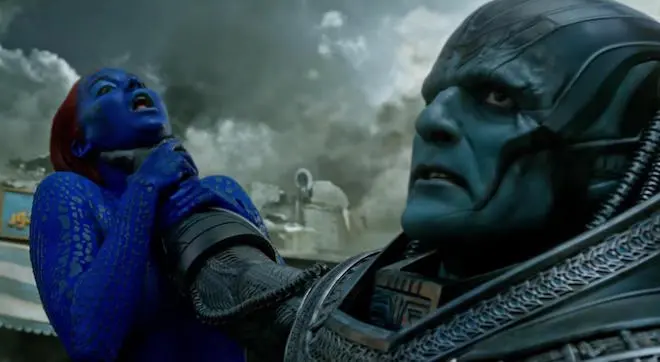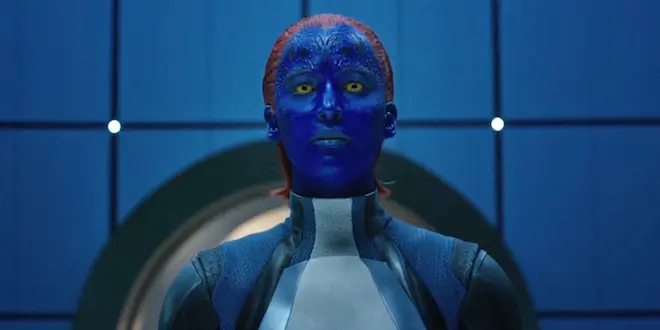X-Men: Apocalypse actually does something that no other film in the 16-year, seven-film franchise has been able to do, and the end results have been divisive between critics, and will only be settled on May 27 when fans get their chance to see the film and weigh-in themselves. For a film based off a comic book series — one of the most popular, and highly-regarded in comics publishing history — X-Men: Apocalypse is the first film to really capture the spirit of the comic books, offering up a titular villain worthy of battling a team of super-powered heroes, and creating situations that still, to this day, are working to erase the stains left by Brett Ratner’s universally hated abomination, 2006’s X3: The Last Stand.
And by actually leaning on the source material more than any other of the X-Men films, director Bryan Singer, who created the franchise in 2000 with the first X-Men and its superior sequel, X2: X-Men United, and then returned for 2014’s hit X-Men: Days of Future Past, has finally made what can only be described as the perfect X-Men film. Yes, you read that correctly. X-Men: Apocalypse is the perfect X-Men film.
X-Men: Apocalypse opens in 3600 BCE in the Nile basin of Egypt. The first mutant, the powerful, god-like En Sabah Nur (Berdj Garabedian) is transferring himself into the body of another, more powerful mutant (Oscar Isaac, Star Wars: The Force Awakens, Ex Machina), when things go wrong, En Sabah Nur — now transferred — is buried under the temple, his body protected by the last acts of his four horsemen.
The film then jumps to 1983 and the audience is reintroduced to the Raven Darkholme/Mystique (Jennifer Lawrence), who seems to be hunting down mutants to help save them, since the world now fears them after the events in the last film, and Erik Lehnsherr (Michael Fassbender), who now lives in Poland under an assumed name and has a wife and daughter. New mutants are introduced, and some familiar characters appear (Kurt Wagner/Nightcrawler, originally played by Alan Cummings, now played by Kodi Smit-McPhee; and Angel/Warren Worthington III, originally played by Ben Foster, now played by Ben Hardy), in younger versions of themselves.
Charles Xavier (James McAvoy) and Hank McCoy (Nicholas Hoult) are hard at work turning the school into a legitimate learning institution, as Xavier has abandoned his dream of training just mutants, but now sees that he can help everyone — human and mutant alike. When Alex Summers (Lucas Till) brings his kid brother Scott (Tye Sheridan) to Xavier’s school after Scott experiences his optic blast power manifest itself at his old school, both Summers’ boys meet Jean Grey (Sophie Turner), a very powerful mutant and one that Xavier has kept his eye one both as a precaution and in awe at her power.
At the same time, in Cairo, CIA agent Moira MacTaggert (Rose Byrne, last seen in X-Men: First Class) stumbles upon the cult of En Sabah Nur, and, of course, things go bad and the ancient mutant is awakened. The all-powerful Apocalypse (as he is quickly dubbed) begins collecting a new quartet of Horsemen in Ororo Munroe/Storm (Alexandra Shipp, who actually speaks in an African accent), Elizabeth Braddock/Psylocke (Olivia Munn, who, while Betsy is either British, or Asian — depending on which versions she’s supposed to be — does not) and Angel, whose injured feathered wing Apocalypse repairs with nifty metal versions, making Angel more powerful than ever.
The trio then set out for their last acquisition, Erik, now discovered as a mutant and facing trouble from the Polish authorities. As the sides are drawn (which is a theme this year in big comic book movies, I guess), Apocalypse seeks to wipe out the world and build a new one in his image, as only the strongest shall survive. And, or course, only Charles Xavier’s wayward students — new and old — can save the day.
James McAvoy is solid as Xavier, still playing him as hip and slightly flirty, with a great 1980s hairstyle and sensibility, and Jennifer Lawrence spends the majority of the film in her “human form,” which seems like a cop out until the audience sees where the budget went in this film during the final battle in the third act, which features some of the most world-ending destruction ever filmed for an X-Men movie.
Michael Fassbender has the biggest change, as when we first saw him in First Class, he was hell bent on killing those who hurt him — or would hurt him, and in each film after, he has been the problem more than the solution. Here he once again has the role, as he is manipulated by Apocalypse to do his bidding and the philosophical head butting between old friends Erik and Charles is once again explored.
Oscar Issac does a wonderful job as Apocalypse, working under a ton of makeup and in a suit of strange space/Egyptian-themed armor. This is the first time that the X-Men have truly faced one of their iconic villains face-to-face. Sir Ian McKellan’s Magneto in the first trilogy, while wonderfully performed, was an old man. The Sentinels and the Hellfire Club served their purposes, but this is Apocalypse. Everything about him is big. His power is unquestioned and his monologues are epic, and watching him woo his followers in one voice and curse Xavier and his X-Men with another is pretty neat. This is the Apocalypse I have always hoped to see on-screen one day, and Oscar Isaac delivers.
Simon Kinberg’s script does an admirable job by telling a solid screen story and also by tying up plots and/or correcting mistakes from literally all seven previous films — including X-Men Origins: Wolverine. If you have ever watched an X-Film and wondered “why?” something was the way it was, X-Men: Apocalypse explains it, for better or worse. Because of this, some characters show up, do one thing, and disappear, and for those not paying attention, it may seem like a lost thread — or wasted cameo — when in reality, it’s solving an issue created by the time-jumping anomalies of the last few films.
John Ottman returns to score X-Men: Apocalypse, giving that sense of familiarity to the proceedings, and 1980s music is used throughout to help establish the time period, including a perfect usage of Metallica’s “Four Horsemen,” and another fantastic scene with Quicksilver/Peter Maximoff (Evan Peters) using his super-speed, set to Eurythmics’ 1983 hit “Sweet Dreams (Are Made of This).”
Honestly, the X-Men films have always teetered on being huge messes. But the multiple timelines and conundrums due to time travel (Days of Future Past) and bad films (X3, Origins) are seemingly righted here, all while sticking closely to the comic book source. Yes, it can’t be fixed that Havoc is older than Cyclops, but switching their ages (and associations with Charles Xavier) makes sense when they are together, looking out for one another. Seeing Scott and Jean meet for the first time — now in this corrected timeline — is iconic. Even a cameo by a certain clawed and feral Canadian works to explain some things and set up the future (which we’ve already seen in previous films). The X-Men films — when measured up with themselves — are as convoluted and crazy as the X-Men comics. And that is why X-Men: Apocalypse works for me. This film is the closest of any of them to the comic books that I’ve read for most of my life.
I mean, in the comic books right now, Hank McCoy has gone back in time and grabbed the original five X-Men — including his younger self — and brought them into the present, where they exist now, alongside their modern, older versions. Anyone who has ever paid attention to a Sheldon Cooper lecture on CBS’s Big Bang Theory knows that this is impossible and the comics just keep going on as if it doesn’t matter that old Bobby Drake/Ice Man has no recollection of any of the events that his younger self is now experiencing — especially since younger Bobby Drake is gay.
There are additional problems here than the crazy, convoluted plots and multiple timelines. Bryan Singer apparently has no idea that the sun does not shine all over the world at the same time, and Psylocke is a completely wasted character. She serves no purpose other than to be one of Apocalypse’s horsemen, and she has limited lines and interactions with others. She could have easily have been saved for the next film — reported to take place in the 1990s — but these are small things to overlook when there is so much else going on in the film. Do these problems break the film? No. But they are noticeable.

Stare at this image long enough and you undoubtedly see the best thing about the character and Olivia Munn’s performance.
X-Men: Apocalypse has that same level of ludicrousness that comes from the comic books. And it’s because of this and many more hidden surprises that this is the perfect X-Men film. It’s not a perfect film — not in the slightest — but it retains the magic that has made X-Men comic books so beloved for so many generations for over 50 years. This is encapsulated in the last scene when we see the team together, in uniform, for the first time as a group of heroes. Not as students, not as teachers at the school — but as the team that will fight and protect both humans and mutants, driven by the careful hand of Professor Charles Xavier. These are his X-Men. And the pay off was worth it.
X-Men: Apocalypse is an action-packed romp of fun, excitement, and mutant mayhem. It continues to work on fixing the issues of the previous films all the while setting up future installments with new cast members in roles that audiences are familiar with. It might seem confusing in places to viewers who have never cracked a Chris Claremont-scripted comic book, but there is enough going on — old and new — to create an epic tale against one of the X-Men’s greatest foes, and one that I honestly enjoyed from beginning to end.
X-Men: Apocalypse is rated PG-13 and is in theaters on May 27.










